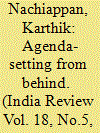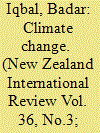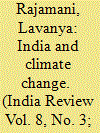| Srl | Item |
| 1 |
ID:
170899


|
|
|
|
|
| Summary/Abstract |
India’s approach and policies at climate change negotiations have garnered considerable interest and attention. Over the last three decades, India’s positions have gained more importance as its carbon emissions rise. In this article, I explain India’s ratification of the Framework Convention on Climate Change (FCCC) using the New Interdependence approach, a framework that explains state behavior by analyzing how global rules affects the domestic politics and policymaking around a particular issue. Specifically, I map how the conflicts around which countries should address global warming influenced the domestic politics of climate change in India, particularly the rise of MEA in leading India’s policymaking on climate change, including FCCC negotiations. MEA’s political understanding of climate change, sharpened by two domestic environmental groups – TERI and CSE, decisively shaped India’s approach at FCCC negotiations. Indian negotiators focused on hammering the differences between developed and developing countries helping shape a Framework Convention that differentiated climate responsibilities based on development constraints.
|
|
|
|
|
|
|
|
|
|
|
|
|
|
|
|
| 2 |
ID:
104791


|
|
|
| 3 |
ID:
091482


|
|
|
|
|
| Publication |
2009.
|
| Summary/Abstract |
From relative obscurity in the late 1980s when it was first discussed in the UN General Assembly,1 the issue of climate change has come, less than two decades later, to be characterized as "the defining human development challenge for the twenty-first century."2 For the years that the international community has engaged on climate change, it has the UN Framework Convention on Climate Change (FCCC)3 and its Kyoto Protocol,4 to show for it. These agreements however do not represent a truly effective and universal solution to address climate change. The emission reduction commitments made under these agreements are inadequate5 and inadequately implemented.6 And, the fundamental premises on which they are based are deeply contested. At the heart of the contestation is a divergence of views between developing and industrial countries on who should bear responsibility, in what measure, and under what conditions to address climate change.
|
|
|
|
|
|
|
|
|
|
|
|
|
|
|
|